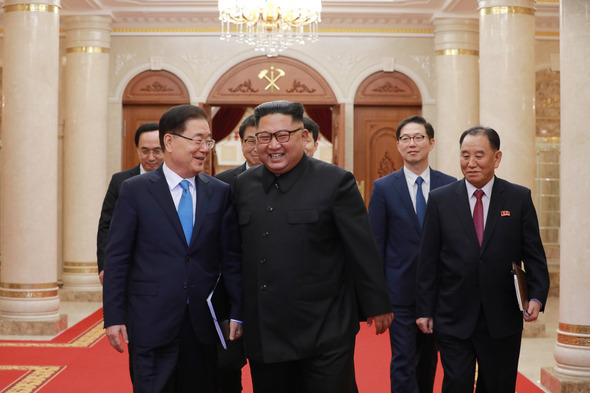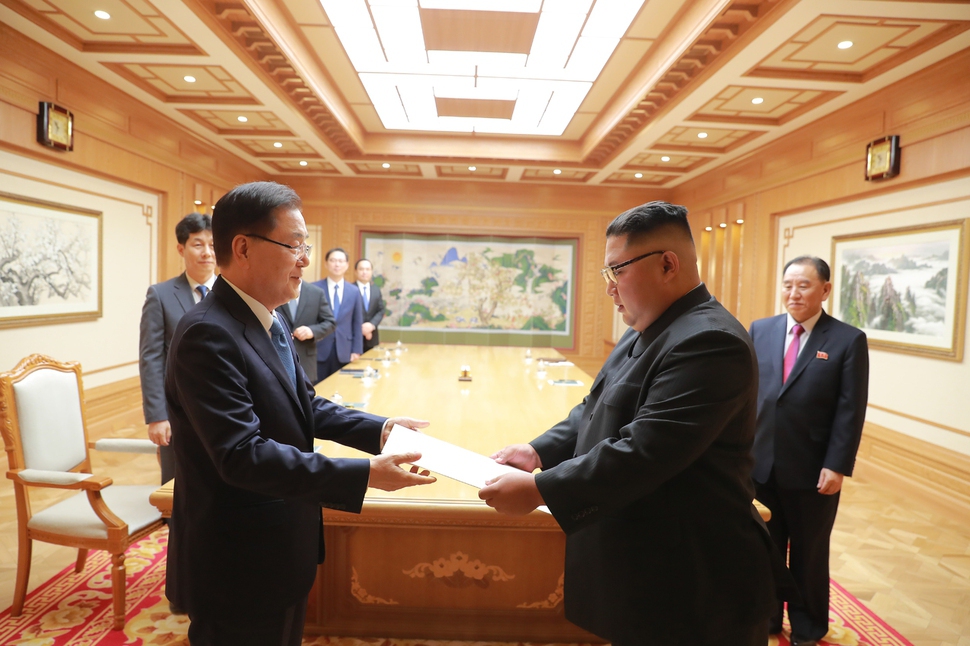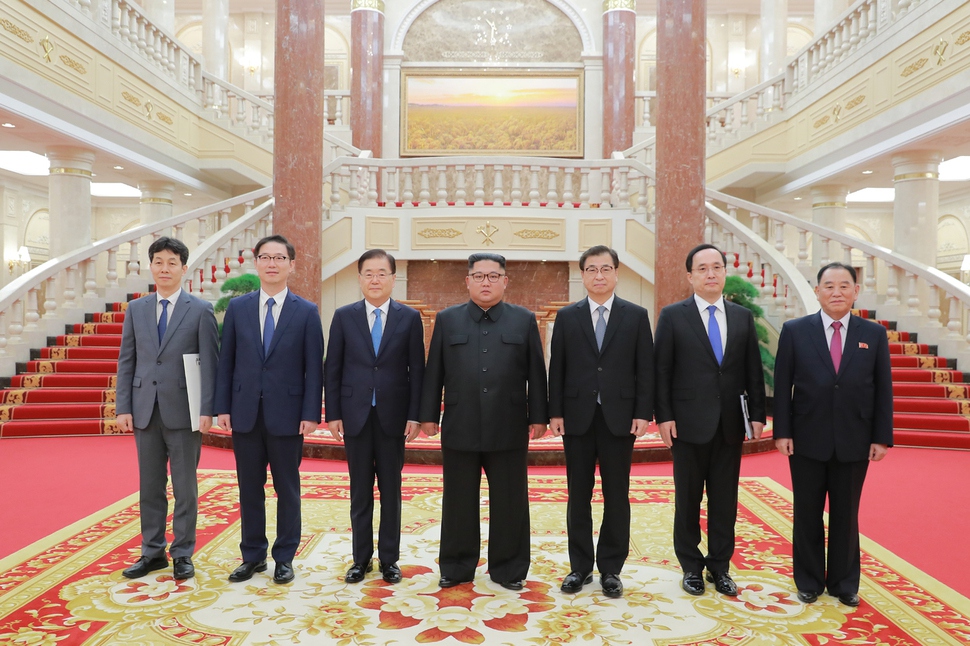Posted on : Sep.7,2018 15:51 KST
Modified on : Sep.7,2018 16:09 KST
 |
|
The special envoy delegation to North Korea, led by Blue House National Security Office Director Chung Eui-yong, meets with North Korean leader Kim Jong-un on Sept. 5. (provided by the Blue House)
|
South and North agree to focus on measures toward denuclearization at upcoming summit
Affairs on the Korean Peninsula, which had appeared to be at an impasse, have gained fresh momentum for dialogue, thanks to South Korean President Moon Jae-in’s decision to send a special envoy delegation to North Korea.
South and North Korea agreed that their leaders – Moon and Kim Jong-un – will focus on the question of peace on the Korean Peninsula, including practical measures toward denuclearization, during their upcoming summit, which will be held in Pyongyang from Sept. 18 to 20. Moon will discuss the results of his summit with Kim during a summit with US President Donald Trump while Moon is in New York to attend the UN General Assembly, which will be held from Sept. 18 to Oct. 1. This lays the foundation for maintaining the momentum for dialogue on the Korean Peninsula through September in the form of direct and indirect “peace talks” between the leaders of South Korea, North Korea and the US centered on Moon, beginning with the inter-Korean summit and continuing with a South Korea-US summit.
If US Secretary of State Mike Pompeo ends up making a fourth trip to North Korea – as he’d been planning to do before his trip was abruptly axed on Aug. 24 – the peace talks on the Korean Peninsula will move onto the fast track.
Trump offered the following reaction in a tweet on Sept. 6: “Kim Jong Un of North Korea proclaims ‘unwavering faith in President Trump.’ Thank you to Chairman Kim. We will get it done together!”
 |
|
Blue House National Security Office Director Chung Eui-yong delivers a letter from South Korean President Moon Jae-in to North Korean leader Kim Jong-un in Pyongyang on Sept. 5. (provided by the Blue House)
|
Kim confirms commitment to denuclearization within Trump’s “first term in office”
During a meeting with the special envoy delegation on Sept. 5, Kim was eager to mollify American suspicions about his commitment to denuclearization. North Korea’s state-run Korean Central News Agency reported on Sept. 6 that Kim had again affirmed his commitment to denuclearization, and Kim emphasized that he “hopes to end the 70 years of hostile relations, continue improving relations with the US and carry out denuclearization during Trump’s first term in office,” as quoted by Blue House National Security Office Director Chung Eui-yong during a press briefing on Sept. 6.
“Chung regards this phrase” – carrying out denuclearization during Trump’s first term – “as carrying crucial significance,” explained Kim Eui-kyum, Blue House spokesperson.
“This is of considerable significance, since it’s the first time that Kim Jong-un has specifically expressed a timeframe for the competition of denuclearization [and the peace process], which is to say a deadline for reaching the endpoint,” said a former high-ranking government official on the condition of anonymity. Trump’s first term runs through Jan. 2021.
The crux of the message to the US that Kim conveyed to the special envoy delegation is “mutual trust.” Kim underlined that his trust in Trump remains unchanged. Kim also addressed the Americans’ hesitation to declare the end of the Korean War on the grounds that this could undermine the South Korea-US alliance. Chung reported that Kim “acknowledged that there are concerns that an end-of-war declaration would weaken the South Korea-US alliance or force a withdrawal of American troops but expressed his opinion that those things have nothing to do with an end-of-war declaration.”
According to Kim Yeon-cheol, director of the Institute of National Unification, this is a public declaration that “Kim has never had any intention of connecting the end-of-war declaration to the South Korea-US alliance” and an assertion that the concerns raised by some in South Korea and the US are groundless. Importantly, Chung emphasized that Kim said that he hopes to see conditions in place that will make him feel that he made the right decision about denuclearization.
The Korean Central News Agency reported that Kim told the special envoy delegation that it was his fixed will and the will of North Korea “to completely remove the danger of armed conflict and horror of war from the Korean peninsula and turn it into the cradle of peace without nuclear weapons and free from nuclear threat” and called on South and North Korea to work together more proactively to achieve the denuclearization of the Korean Peninsula.
“This shows that Kim is still clearly determined to resolve this situation. This is fortunate for us, since it means that Kim isn’t willing to let the US rattle his chain,” said a former high-ranking official.
Principle of simultaneous action
But Kim also appears to have emphasized the “principle of simultaneous action” in his meeting with the special envoy delegation and made clear that denuclearization will not happen unilaterally. This is the context of Chung’s remark that “Kim strongly expressed his resolution to take more proactive steps toward denuclearization if [the US] responds in kind to the North’s preemptive measures.”
Given Chung’s remark that “Kim asked us to convey a message to the US,” well-informed sources believe that Kim may have shared with the envoys North Korea’s solution to resolving its disagreement with the US about their reciprocal measures, namely steps toward denuclearization and the end-of-war declaration.
“Since the inter-Korean summit is just 12 days away, Kim Jong-un could take that opportunity to disclose some practical steps toward denuclearization,” said Cho Sung-ryul, senior research fellow for the Institute for National Security Strategy.
In addition, peace has been selected as the key topic of Moon and Kim’s third summit, the same as their first summit in Panmunjom on Apr. 27. This appears to be the result of a strategic decision that military confidence building between South and North Korea is not only an effort to establish peace that’s linked to the commitment to denuclearization but also an area where the pace can be accelerated despite the UN and US sanctions on North Korea.
The underlying assumption here is that the fundamental reason that the Korean Peninsula remains a lonely outpost of the Cold War is because of both hostility between North Korea and the US and because of the continuing military standoff between South and North Korea.
 |
|
North Korean leader Kim Jong-un poses for a commemorative photograph with the South Korea special delegation to Pyongyang, led by Blue House National Security Office Director Chung Eui-yong (third from left), on Sept. 5. (provided by the Blue House)
|
Peace is the economy
Such an approach is consistent with the shared view of South and North Korea that “peace is the economy,” as South Korean President Moon Jae-in said during his celebratory address for Liberation Day, and that “in order to carry out the strategic line of focusing all efforts on building the economy, a peaceful environment on the Korean Peninsula and its environs is more important than ever before,” as North Korean Foreign Minister Ri Yong-ho said during a speech in the ASEAN Regional Forum (ARF) on Aug. 4.
This also reflects the practical consideration that the third inter-Korean summit cannot be focused on finding ways to promote South and North Korea’s co-prosperity, including large-scale economic cooperation, as had been originally planned, because of the continuing sanctions on the North. In connection with this, the government is reportedly planning to emphasize its commitment to co-prosperity and economic cooperation by sending a large business contingent to accompany Moon on his trip to Pyongyang.
By Lee Je-hun, senior staff writer, and Kim Ji-eun ad Noh Ji-won, staff reporters
Please direct comments or questions to [english@hani.co.kr]











